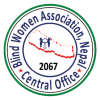Promoting economic justice of women with disabilities through financial inclusion
According to the 2011 census, 1.94% i.e. 513,321 individuals in Nepal are living with disabilities, among whom 233,235 are women. However across every sphere, from health to the economy, security to social protection, women with disabilities are more vulnerable as they are often socially marginalized and face widespread discrimination that restrains their access to assets and restricts their participation in economic activities, decision-making, and social life in general.
The Government continues to utilize a blanket approach, with limited policies/programs to address the differential needs of women with different types of disabilities nor have these constitutional provisions been translated into practice. It is due to all these barriers that these women have not been able to exercise their economic rights, unlike those without disabilities, making them financially dependent on others, further exacerbating their vulnerability towards abuse, exploitation, and discrimination.
Therefore, under the support of the Open society foundation/ Alliance for social dialogue (OSF/ASD), the project “Promoting economic justice of women with disabilities through financial inclusion” is being carried out to advocate to ensure equal opportunities and participation of women with disabilities in economic sectors that would support them to lead dignified lives free from discrimination.
The specific objectives are:
- To advocate for the economic rights of women with disabilities in both the Governmental and private sectors
- To promote financial inclusion by promoting women with disabilities access to a range of financial products and services that cater to their diverse needs
Following activities will be carried out according to the objectives.
Objective 1: To advocate for the economic rights of women with disabilities in both the Governmental and private sectors
A. Activity 1: Documentation and evidence-generation
- Policy brief
- Video Documentary, “ Women with disabilities struggle to exercise their economic rights”
- Accessibility audit
- Legal aid support
B. Activity 2: Advocacy to protect the economic rights of women with disabilities
- Advocacy with the Local Governments
- FNCCI
- Advocacy with the private sector
Objective 2: To promote financial inclusion by advocating to increase women with disabilities access to a range of financial products and services that cater to their diverse needs
C. Activity 3: Advocacy for financial inclusion
- Nepal Bankers’ Association and Nepal Rastriya Bank
- Insurance Board
D. Activity 4: Advocacy through media mobilization
E. Activity 5: Follow up with the beneficiaries
